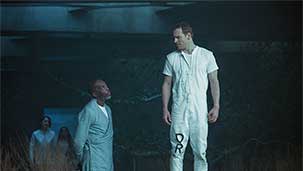The greatest shortcoming of Assassin’s Creed is something that should be a strength. When you have lead actors like Marion Cotillard, Michael Fassbender, Jeremy Irons, and a supporting cast led by yourself as well as real heavyweights like Brendan Gleeson and Charlotte Rampling, the last thing you would expect is a dearth of memorable character moments.
Unfortunately, the exigencies of making a film stuffed with needlessly complicated and paper-thin plot leaves scant room for anything much resembling character development. And that’s a real shame, because you are one of those people who can elevate a whole production with very little screen time. You have the rare talent of carrying a scene while still making more than enough room for all the actors around you. In the right kind of film (or TV series) this kind of added value can turn something from good to great.
The plot in question involves the kind of video game world building that works just fine within those narrow parameters. But when translated to the big screen, Assassin’s Creed feels exactly like what it is: a convoluted and weakly threaded together mashup of pseudoscience and historical melodrama that sees Michael Fassbender required to relive an ancestor’s past life in order to locate the final resting place of a shiny (and primal) McGuffin. This kind of thing can work, but it’s a tightrope walk—especially when you're afraid to change any detail that might betray the source material or the upset the intended audience.
When I saw the first trailer for Assassin’s Creed, it wasn’t just the promising visual style of director Justin Kurzel that showed immense promise—nor the fact that Michael Fassbender and Marion Cotillard were cast as the leads that made me think it may be something special. What most impressed me most was your presence. Often the biggest problem with films that are largely dependent on their action beats is they are populated with one or two name actors and then—nothing. Everyone else is a bland cypher, utterly indistinguishable from one another, both as actors and on the page.
The best examples of action films that manage to transcend their narrow genre restrictions almost always have at least one or two, if not more, memorable supporting characters that lend a groundedness to the proceedings. Think Ian McShane and your Wire alumni Lance Riddick in John Wick, the fucking terrifying Yayan Ruhian (aptly named Mad Dog) from The Raid:Redemption, or Clive Owen as Matt Damon’s reluctant nemesis in The Bourne Identity—not to mention just about every speaking part in Mad Max: Fury Road. What contrasts these characters from the usual cannon fodder is twofold. First, they have the ability to create memorable three dimensional characters with admirable brevity. And secondly, they are given just enough screen time and attention in the script to help flesh out the world that the leads exist within—and that means that their presence pulls the audience deeper into the story. Which also means what’s happening up on the screen is invested with a kind of emotional resonance that gives real weight to the carnage.
All of the above would seem to indicate I didn’t think much of Assassin’s Creed, and the truth is it’s a deeply flawed film.
But.
Your director is possessed of a rare visual genius. This manifests especially during the regressions to 15th century Spain. There are moments of dizzying art buried in this otherwise messy production—enough of them that I left the theatre feeling inspired by a kind of excitement that few films of this sort manage to elicit from me these days. Assassin’s Creed, despite it’s thin characterization and truly weak third act, contained moments that films that otherwise were far more tonally consistent never manage. Movies like The Force Awakens or Captain America: Civil War just didn’t move me the way Assassin’s Creed did. I will watch this film again and again, enduring its weaknesses, just to get a taste of that very rare flavor of visceral excitement, and the inspiration it foments in me. Something I can’t honestly say about most other films in this genre.
Still, it’s a damn shame you weren’t served in the way you should have been, Michael. But I have hope that, one day soon, you’ll be given the opportunity David Simon was smart enough to provide you with so many years ago. Until then, fingers crossed.
Sincerely,

Tim







